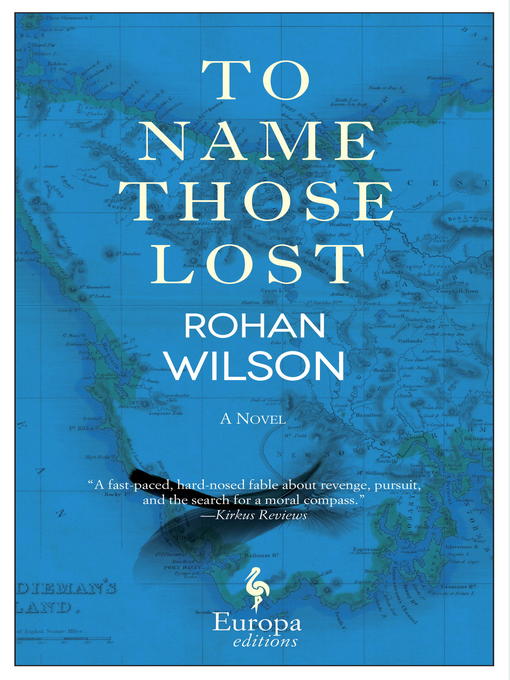
To Name Those Lost
A Novel
کتاب های مرتبط
- اطلاعات
- نقد و بررسی
- دیدگاه کاربران
نقد و بررسی

January 2, 2017
Wilson’s (The Roving Party) second novel is as violent, bleak, and absorbing as his highly-praised first. Again the setting is Tasmania, this time taking place in 1874. The efficient plot could be described as the tale of two seekers, dogged and inimical, squaring off. Thomas Toosey, an ex-convict said to be “on winking terms with the devil,” is looking for his son, whose deceased mother he abandoned, to start a new life together. The Irishman Fitheal Flynn, “mad as a sack of rabbits,” is looking for Toosey, who stole a considerable amount of money from him, and committing a more heinous act in the process. As Toosey gets closer to finding his son, Flynn gets closer to catching up with Toosey. They all converge in the chaotic, rough-and-tumble town of Launceston, whose inhabitants are rioting in protest of a new railway tax. Wilson has a fine ear for dialogue and nicely sketches main and supporting characters alike, except in the case of a lamentably cartoonish Chinese innkeeper. The brisk tale doesn’t wade too deeply into the historical weeds, rather proceeding steadily to its final confrontations, inevitable but dramatic, savage but not gratuitous. This is a satisfying, grimy adventure about a reciprocal violence that pollutes.

December 1, 2016
The second novel from Australian writer Wilson, whose debut (The Roving Party, 2014) won literary prizes and comparisons to Cormac McCarthy, offers another stylish--if familiar--contribution to the literature of lyric violence.Tasmania in 1874 is a combination of bedlam and Hieronymus Bosch, peopled with sots, convicts, derelicts, opportunists, and hard cases of every kind. The town of Launceston is a remote and lawless outpost of this remote and lawless outpost. At the novel's beginning, a middle-aged mother in the town dies, leaving her 12-year-old son to the tender unmercies of the local constabulary and a "charitable" man named Stewart who exposes himself to hungry children as the price of his generosity. The boy dispatches a letter to his father, Thomas Toosey, a reformed drunk who was convicted of infanticide and sent off years earlier. The elder Toosey, a ruffian among ruffians, embarks on a desperate journey to save his son. He is pursued at every step by a vengeance-bent Irishman named Fitheal Flynn and Flynn's silent, mysterious hooded companion, who goes by the name of the legendary hangman Ketch. As Toosey arrives in Launceston after years of exile, with Flynn and Ketch close behind, a brutal street riot breaks out over an unjust railroad levy, and violence begets violence begets violence. In thinking of American analogues, one is reminded less of McCarthy and more of writers like Tom Franklin and Donald Ray Pollock, but the book lacks the dark, ribald humor of Pollock and the interest in tangled racial history behind a novel like Franklin's Hell at the Breech. Still, this is a fast-paced, hard-nosed fable about revenge, pursuit, and the search for a moral compass in a place where chaos and rage and injustice set every dial wildly aquiver.
COPYRIGHT(2016) Kirkus Reviews, ALL RIGHTS RESERVED.

Starred review from February 1, 2017
Among the proper and prosperous residents of 1870s Launceston, Australia, are a number of miscreants, molesters, and murderers, members of that country's storied past. One of these men is Thomas Toosey, a dangerous and desperate outlaw on the hunt for his son, William, who has recently lost his mother. Hot on his heels are Fitheal Flynn, from whom Toosey stole a worldly fortune of two hundred pounds, and Flynn's daughter, Caislin, who was badly injured in their tussle. Between these men is a ragtag crew of street urchins, some of whom hope to profit by revealing the whereabouts of one to the other. The two fiercely protective fathers will go to terrible lengths for the money, hoping to provide a better life for their children. VERDICT Readers who admired the propulsive plotting, atmospheric sense of place, and fierce family loyalty in Patrick DeWitt's The Sisters Brothers and Cormac McCarthy's The Road should be equally taken with Wilson's (The Roving Party) superb novel. Highly recommended.--Barbara Love, formerly with Kingston Frontenac P.L., Ont.
Copyright 2017 Library Journal, LLC Used with permission.

Starred review from February 1, 2017
And the sound of love is to name those lost who lived for others. Wilson tells a tale of love, rendered with aching beauty through the medium of loss. Upon his mother's death, William Toosey is left alone and adrift in Launceston, Tasmania, a hard and dangerous place in 1874, at the very end of the civilized world. His long-absent, convict father, Thomas, is willing to commit terrible acts to reunite with his young son. Standing in Thomas' way is the consequence of one of those acts, the ceaseless stalking of the boy by Irishman Fitheal Flynn and his strange, hooded companion. They intend to force repayment of a debt or exact the ultimate price. Like his first novel, The Roving Party, (2014), Wilson's second has garnered Australian literary awards, and the praise is entirely justified for this masterly portrayal of familial relationships in a society in which the threads of civilization have frayed to the snapping point. The prose is viscerally direct and unsparing in its emotional impact. A Launceston native, Wilson's evocation of the Tasmanian setting is pitch-perfect, as are his characterization and the suspense maintained throughout this exquisitely wrought novel.(Reprinted with permission of Booklist, copyright 2017, American Library Association.)

























دیدگاه کاربران